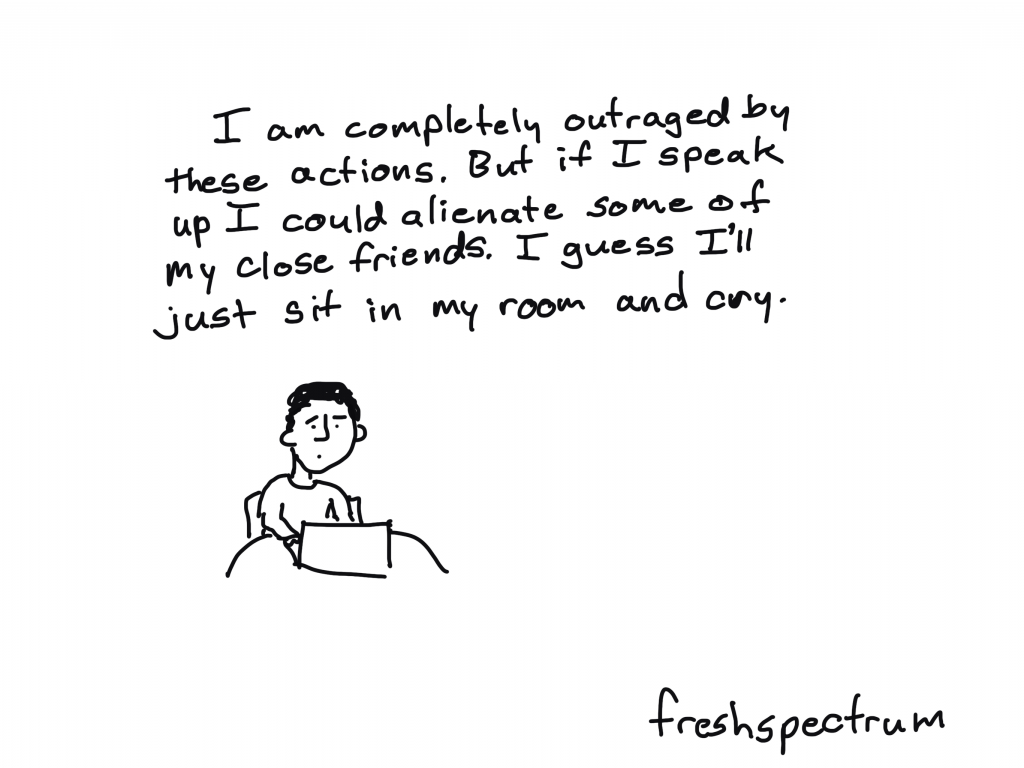This is an Eval Central archive copy, find the original at freshspectrum.com.
This week’s post was written by Khalil Bitar. Khalil is an evaluator and M&E specialist who has been a leading voice in the EvalYouth global movement. He was also the founder and first president of the Palestinian Evaluation Association (launched in 2013). I invited Khalil to write a post sharing his views during the conflict and Israeli airstrikes on Gaza in May. These are Khalil’s words, I contributed the cartoons.
Something isn’t right about evaluation that doesn’t put (social) justice in the forefront. Something is also pretty wrong in my view about paying attention to justice and equity —by evaluators— only concerning particular issues and not others. Are we short in the community on both fronts? It seems so. I will explain why I think so in this blog.

A little bit of context first. Recently, during the Israeli Occupation’s aggression in my country of Palestine, which resulted in the killing of over 280 people (among them 66 children), I noticed a sort of silence toward what was happening among evaluators. I took it to Twitter. I spoke directly to fellow evaluators. This is what I wrote:
I wrote that because I noticed that many colleagues and friends from the community —who are usually active in speaking up against injustice in other parts of the world— were mostly silent when it came to Palestine. Many of these colleagues are from North America and Europe, where supporting Palestine and the Palestinian cause is sensitive, often due to conflating criticizing Israel with anti-Semitism within the political circles and mass media outlets. Chris reached out to me in the midst of all of this and invited me to write a blog on Freshspectrum, which I love and often read, so I am writing this blog.

It was powerful —and important— to observe and be part of the activism by members of the international evaluation community during the Black Lives Matter (BLM) marches in the US and many other places around the world last summer after the cruel murder of George Floyd. It mattered because speaking up against injustice in all ways possible, including on social media, raises awareness about these injustices and challenges the status quo. Among many things, it showed how the evaluation community —like many other people and communities around the world— is eager to speak up against injustice and join forces with others in doing so.
However, I noticed during the aggression on Palestine that very few colleagues in the community were speaking up against injustice in Palestine. I received some very kind private messages. But, in general, only a handful of colleagues seemed to have followed what is going on in Palestine or share about the matter on their own social media pages as they have been doing concerning the BLM movement, climate change, or indigenous people’s rights.
This was happening while —even in the US— some progressive congresswomen and congressmen —perhaps for the first time— publicly criticized and condemned Israel’s actions in Palestine requesting to halt the US military aid to Israel; demonstrations were taking place in most big cities in the US, Canada, Europe, and other countries in most regions of the world; and social and mass media outlets were saturated with news about the bombardments, ethnic cleansing in Sheikh Jarrah, and assault on activists and journalists. But this aggression, occupation, ethnic cleansing, and apartheid (as categorized by Human Rights Watch and other human rights organizations) also happened with shameful political support and military assistance to Israel, especially from the US, Canada, and several countries in Western Europe.

I believe that evaluation colleagues in these very countries have a particular responsibility to speak up against injustice in Palestine. They should speak up against injustice in other places too, especially where their governments have been destabilizing other countries’ political, economic, and social systems —in Asia, the Middle East, Africa, Latin America, and other places. Evaluators can’t separate themselves from what is going on around the world. They have even greater responsibility and duty when their governments actively fund and defend a country colonizing other people, ethically cleansing them, and exercising apartheid, like in the case of Palestine. The US alone provides Israel with $3.8bn annually in military aid.

I understand that many may believe that the situation is complex and that they don’t understand it. It is not. It is an occupation, apartheid, and ethnic cleansing. One of the Occupation’s —and its enablers’— main tactics has been to make the situation seem so complex so that settler colonialism continues as it is. Others might be concerned that supporting the Palestinian people’s struggle for liberation could be seen as anti-Semitic. It is not. They can check the work of the many Jewish organizations and activists who are among the most outspoken against the Occupation and Apartheid, or the work of other Palestine activists who —in words and deeds— fight anti-Semitism hand in hand with their struggle against the Occupation.

Others might feel the injustice in Palestine is not relevant to them or the issues on which they focus. To those colleagues, I find nothing more relevant than what Martin Luther King Jr. once said: “Injustice anywhere is a threat to justice everywhere.”